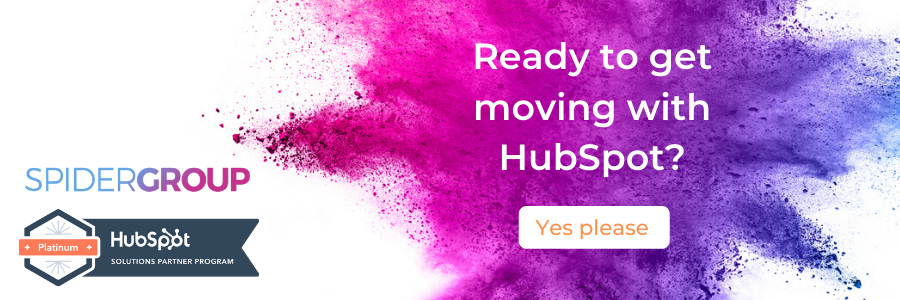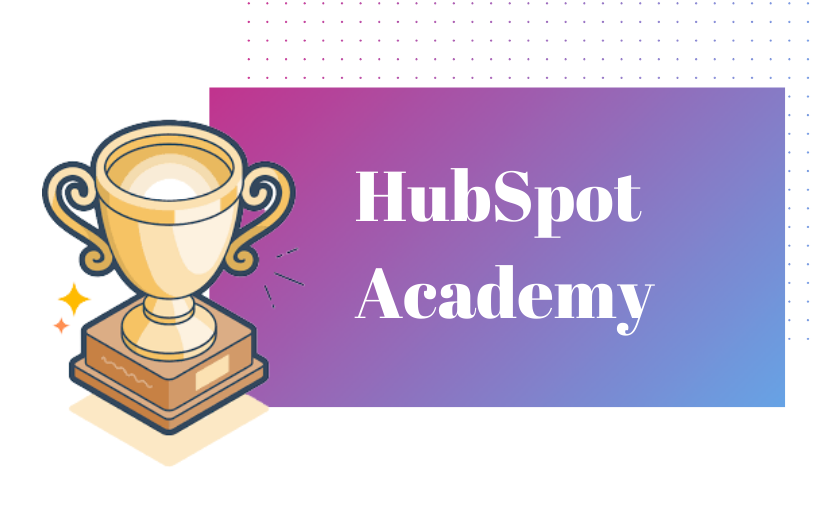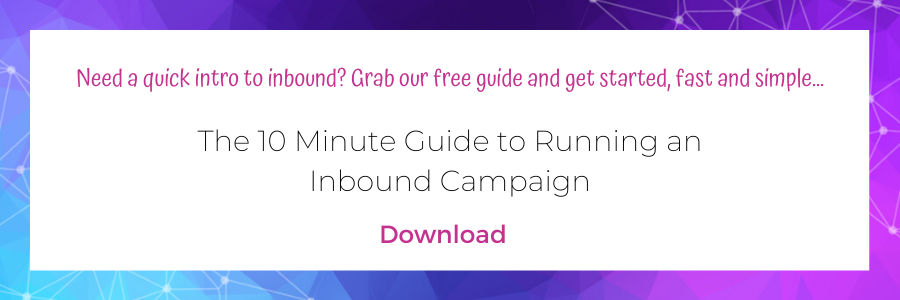(updated June 2021)
As HubSpot partners, we've spent a lot of time in the delights of the HubSpot Academy, so here's a guide to what you need to know about this tool. Here's a quick table of contents if you have something specific you want to find...
- HubSpot Academy Review
- Are HubSpot Certifications Worth it?
- How to get HubSpot Certifications
- HubSpot SEO Certification
- HubSpot Academy - Inbound Marketing
- HubSpot Marketing Software Certification
- HubSpot Sales Training
- HubSpot Social Media Certification
- NEW: HubSpot Digital Marketing Certification
- Additional Certification Courses
- HubSpot Certification Answers
In a nutshell, the Academy is an online training tool with hundreds of hours of videos across a huge variety of courses, lessons, and certifications.
There are plenty of different courses, covering a wide range of topics, but we find most people tend to focus on the certifications - those are the ones where you get a special certificate (and digital badge) to affirm your success at passing the course.
HubSpot Academy Review
Let's start this off with a quick review...
Highlights:
There are so many courses to choose from, across the HubSpot technology itself, as well as more general Inbound Marketing techniques. So, it's a highly useful resource, especially if you're using any of the HubSpot apps.
It's also free - all of the courses and certificates are part of your HubSpot account, no extra charges. Which makes getting to grips with not only the software, but also the principles behind the inbound method, nice and easy.
If gamification is your thing - and I can't deny that it very much is mine - then collecting badges in the Academy hub can be wonderfully motivating.
The videos are broken out into short chunks, and you can download worksheets and transcripts as required.
Lowlights:
Because the courses are free, some people consider them to be less valid than paid courses (more on that later).
The presenters also vary considerably - which may be a benefit, because no doubt there are some that I don't like that might actually be your favourites. As everyone is different, having a range of presenters probably hits more positives than negatives, but I can't deny there are a few that make everything feel like a bit of a slog!
Tips:
Some of the presenters talk extremely slowly. This helps with accessibility, but can start to feel monotonous. If that happens, just bump the speed up to 1.5x and everything gets a bit more lively. You can go as far as 2x speed, but I find that a little extreme. If, on the other hand, you like to slow things down, you can do that too.
If you have a lot of experience in a particular topic, there's nothing to stop you going straight to the exam rather than reviewing all the videos. If you don't pass, you'll get a breakdown of which questions you got wrong, so you can focus on the areas you need a refresher on without going through the entire course.
Are HubSpot Certifications worth it?
Full disclosure - as a team, we go through and complete the HubSpot certifications that are relevant to our roles - or, if you're anything like me, as many as possible because you like the badges and want to be an expert. You can see how many we've achieved as a team, below (actually, we've added a few more on since this snap was taken, but they don't display them in quite such a nice way anymore).
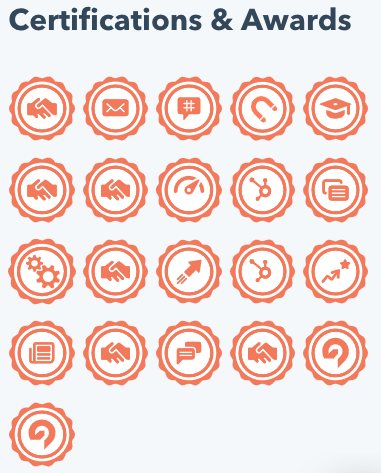
So, for us, yes they are worth it. But what about more broadly?
- While free courses are sometimes considered less valuable than paid ones, that's not true for everything. Google's courses, for example, are completely valid. And so are HubSpot's. They're well produced, comprehensive, and cover a dazzling array of topics. So, if you want to know whether they're worth your time, we'd have to say yes.
- If you're wondering whether or not they're worth it in terms of bolstering your CV/resume, then that's perhaps a different matter. They certainly will be if you're looking for a role within a company that uses HubSpot - they'll put you a step above competition who don't have that training. Even if you're not looking to move to a HubSpot-using-company, you'll still have gathered a breadth of knowledge that will support your skills.
- For your own development, then yes, we'd absolutely say they're worth it. There are tonnes of topics that cover interesting, useful, and fascinating information. As someone who has been working in this industry for more years than I care to admit, I've still learned something new each time I've completed a new course.
- Boston's Northeastern University accepts HubSpot training as transferable, and HubSpot work with tens of thousands of universities - so it's not like these are throwaway courses that don't matter to anyone.
- The fact that the certificates expire after 2 years is also another factor in their favour - digital marketing changes rapidly, so any certificate that lasts indefinitely is certainly going to be outdated within a handful of years. Having to review and retake the certification regularly means you'll have to keep up to date with the industry, making those qualifications more reliable and trustworthy.
How to get HubSpot Certifications
Getting your certifications through the HubSpot Academy is simple. If you don't have an account yet, visit academy.hubspot.com and click the big orange sign up button.
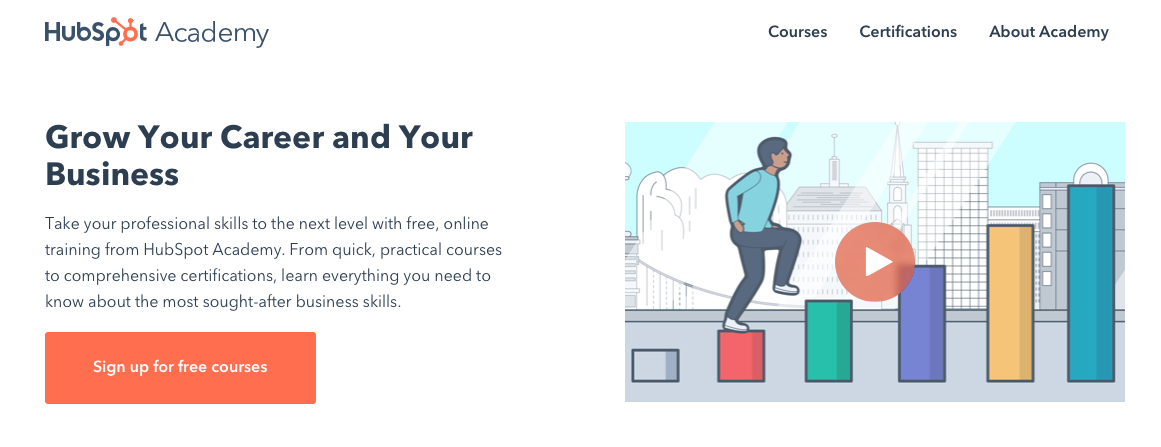
Can you sign up without a company domain?
Yep, you can even sign up with your Google account, so if you're a gmail user, you're all set.
If you already have an account, you can find the Academy either through the link above, or through your account - just click on your avatar in the top right hand of the header (on any page), and select HubSpot Academy.

Once you're in, it's time to start looking through the courses and lessons on offer - or type what you're after into the search bar. You can filter courses by topic, difficulty, and whether or not you've started or completed that particular course.
After you've chosen your course, get stuck in and watch the videos, complete the quizzes, and sit the exam. The exams are multiple choice, and you usually have 3 hours to complete them (some of the quicker courses have shorter exams). Make sure you read the wording of the questions carefully, so you don't get caught out on a phrasing issue.
Some courses require you to do practical exercises - usually the HubSpot software courses - so you'll need to complete those before getting the certificate. You can still take the exam while you're waiting for the practicals to be approved, you just won't officially complete the course until both sides are done.
When you finish your exam, you'll get an immediate result as to whether or not you passed, along with your score.
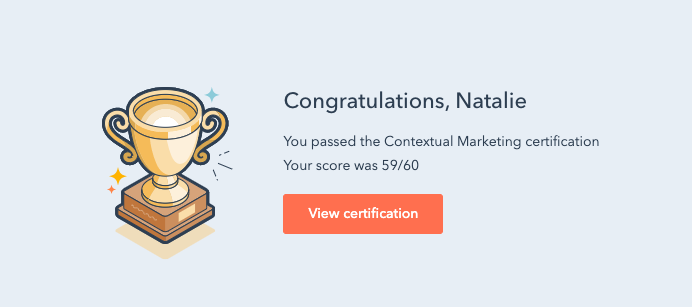
If you didn't pass, you'll get a list of the questions you answered correctly and those that were incorrect, so you can more easily review the areas that were giving you trouble (you won't get your incorrect answers listed, though).
While you don't have to pay for any of the courses themselves, there are a few that require you to have a Pro or Enterprise level subscription to complete them. Again, these are generally the HubSpot-specific software courses, designed for HubSpot users or partners. The general digital marketing courses don't have this requirement.
HubSpot SEO Certification
When we first wrote this post (back in January 2020), there wasn't a specific SEO certification, but that's since changed. Now, there is!
This course lasts 3 hours, covers the fundamentals of SEO, and includes a certification if you pass the exam. You'll learn concepts and it's not made to be specific to any one tool (though you'll get tool recommendations throughout the videos)
The courses we recommended before the SEO course are still worth a look, though...
The Inbound Marketing Certification covers the fundamentals of inbound, content strategy, topic clusters and pillar pages, a conversational growth strategy, and lead nurturing - so some parts are SEO, and others a wider look at digital marketing.
The Content Marketing Certification focuses specifically on content (funnily enough) and covers generating ideas, content creation, frameworks, and topic clusters, as well as video marketing. A few of the lessons have an SEO-focus, including using blogging to rank on Google and building a guest blogging strategy powered by SEO.
There is an SEO Training on the HubSpot Academy if you want something completed focused on it, but that course doesn't come with a certificate.
Who are these courses for?
Marketers wanting to learn more about the inbound methodology - either novice marketers or those looking to transition to an inbound approach.
What does the course entail? Content Marketing
- 11 Lessons
- 32 Videos
- 11 Quizzes (optional, but a good way to check in with your learning)
- 1 Exam
HubSpot Academy - Inbound Marketing
There are actually two 'inbound' certification courses on the Academy: Inbound and Inbound Marketing (ignoring the now defunct Inbound 2017 course you might also see referred to).
Inbound is the business-focused, high level course. You'll learn about the flywheel method (it replaces the traditional funnel), business goals and company purpose, and of course the fundamentals of inbound. The methodology includes sales and delivery, as well as marketing, so this course is a wide look at how everything fits together.
Inbound Marketing is, unsurprisingly, more focused on the marketing elements of the methodology - from strategy to execution.
Both courses are worth doing if you have an interest in Inbound. The wider course is a great way to get to grips with your buyer personas and buyer's journey, and truly understand the principles of inbound as a business tool rather than just a marketing technique.
The marketing-focused course is a deeper dive, with a whole lot of actionable insight into using your marketing more effectively.
What does the course entail? Inbound Marketing
- 7 Lessons
- 25 Videos
- 6 Quizzes
- 1 Exam
What does the course entail? Inbound
- 6 Lessons
- 15 Videos
- 4 Quizzes
- 1 Exam
HubSpot Marketing Software Certification
This course, along with the equivalent Sales Software Certification, are designed to provide the training you need as a user of the HubSpot platform.
You'll learn about the HubSpot Marketing Hub and how to use it, how to create a content strategy, how to use the contacts database, how to create campaigns and blog posts... Plus landing pages, CTAs, segmentation, social media, workflows, and reporting.
Essentially, you'll learn how to use all the elements of the marketing hub. Given that it's such a big platform, this is the perfect way to make sure you get the most out of it.
This is one of the longest courses, so you might want to break it out over a period of days. Most section of the course require you to complete a practical exercise to prove your knowledge - for example creating a landing page and writing a blog post. These tasks are verified by HubSpot, which can take a day or so to happen, so keep checking back until you see the tick. .
Who is this course for?
This one is for anyone using HubSpot for marketing. Even if you think you know everything, it's worth watching the videos for hints and tips you might not have come across yet.
What does the course entail?
- 16 Lessons
- 75 Videos
- 13 Quizzes
- 13 Practical Exercises (required to complete the certification)
- 1 Exam
HubSpot Sales Training
As you can probably tell, there is plenty of sales training on offer through the HubSpot Academy.
- Inbound Sales - the inbound approach to sales
- Frictionless Sales - the flywheel and how it transforms the funnel
- Sales Management - strategies for developing a successful modern sales team
- Developing a Sales Plan - put together a focused and actionable sales plan
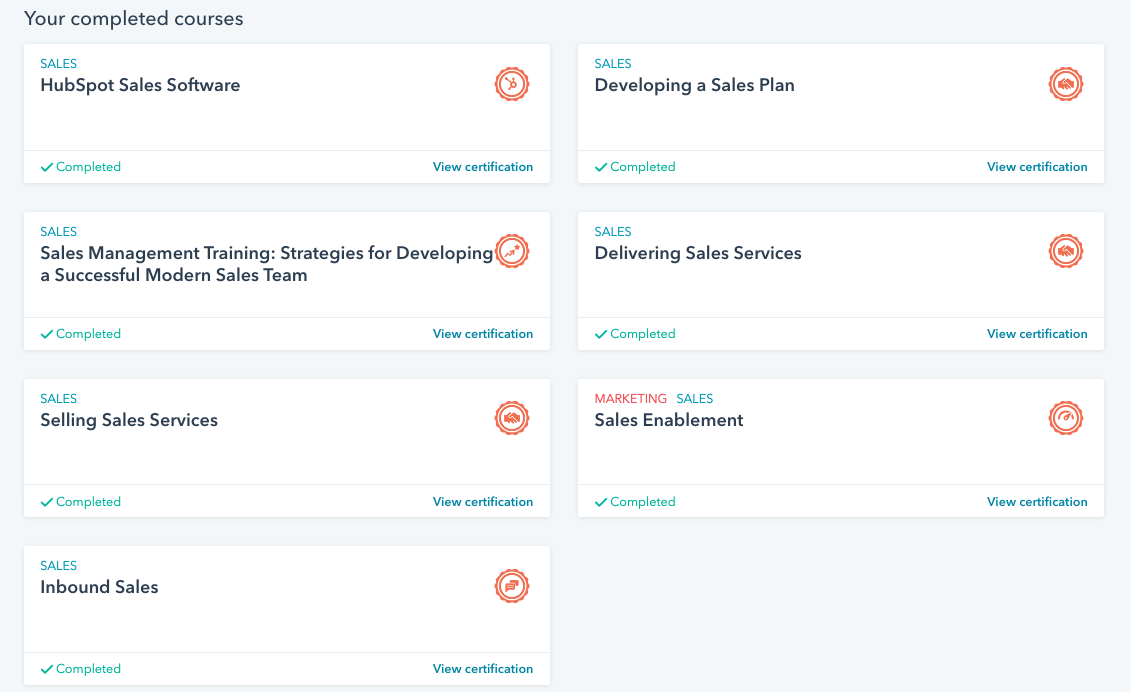
All of these courses focus on learning sales skills, using the inbound methodology to support sales, and how to use the flywheel method.
The Sales Management course is especially good if you're leading a sales team, with actionable tips and insights from industry professionals including professors from Harvard Business School, sales experts, business leaders, and consultants.
You cover how to map a sales process, techniques for training your sales team, how to coach a team, how to hire the right sales people, onboarding your sales team, and the 'jobs to be done' principle.
Non-certification courses are also available, including how to nurture leads and customers with HubSpot and building your lead engagement strategy, along with specifics on how to use HubSpot for reporting and CRM.
If you want your sales team to get the most out of HubSpot, pick up some of these courses - we have a list of specific courses our new team members are expected to complete when they join us, and all of them have found the content useful and insightful.
HubSpot Social Media Certification
If you want a refresher on your social media strategy, listening and monitoring, the basics of digital advertising, and using social media to build relationships, this is the course for you.
The Extending your Reach section includes topics on influencers and UGC (user generated content) - both key social areas - while the strategy sections dive into channels, KPIs, budget, content, tone, and testing.
Who is this course for?
The Social Media certification is, somewhat obviously, designed for people who use social media for business - whether that's social media managers, content marketing managers, or digital marketing professionals in general.
What does the course entail?
- 9 Lessons
- 40 Videos
- 1 Exam
NEW: HubSpot Digital Marketing Certification
Another new course for 2021 is the Digital Marketing certification.
You'll cover the fundamentals, content creation frameworks, website performance, content creation, video marketing, social media, paid search, and email marketing... So it's a pretty comprehensive topic.
Who is this course for?
This one's for anyone who works in digital marketing, simply enough. Even if you specialise in a particular area, having a broad knowledge is helpful, so it's worth it even if you're not a generalist.
What does the course entail?
- 10 Lessons
- 36 Videos
- 15 Quizzes
- 1 Exam
Additional Certification Courses
We've covered a few of the big topics above, but that's only the tip of the iceberg for the courses that come with certificates. You can also dig into:
- Contextual Marketing - using smart content and personalisation
- Growth Driven Design - building and optimising peak performing websites
- Sales Enablement - develop a marketing-driven sales enablement strategy
- Email Marketing - email marketing strategies and delivery
There are also a variety of certifications for HubSpot Partners, so if you're working within an agency, you'll probably want to grab a few of these as well:
- HubSpot Agency Partner - required for partners, this covers the four pillars of the agency partner framework
- Delivering Client Success - improve your client delivery process
- Client Management - how to effectively manage clients throughout each lifecycle stage
- CMS Implementation - project manage website redesign and CMS implementation processes
- Partner Demo Course - learn how to run an impactful demo to prospects
- Growth Driven Design Agency - deliver better client results with GDD website retainer services
- Selling Sales Services - how to package, price, and sell sales services
- HubSpot CMS for Developers - learn to build and manage websites in the HubSpot CMS
As you can see, the HubSpot Academy doesn't skimp on materials! And these are just the courses that come with certificates, we haven't even touched on the many, many other courses and lessons you can choose from. Here's just a handful, to give an idea of the scope:
- How to Build a Paid Media Strategy
- Introduction to the HubSpot APIs
- How to Build an Advanced Twitter Strategy
- YouTube Marketing
- Measuring Brand Engagement and Emotional Connection
- Graphic Design Essentials: Easy Steps for Creating Your Own Compelling Visuals
- Fundamentals of Conversational Growth Strategy
On top of these, there are a variety of HubSpot-specific lessons to help you set up, manage, and excel at your use of the platform.
HubSpot Certification Answers
We know this gets searched a fair amount, and there are people who want to know the answers to the exam questions in order to get a certificate without having to do the work. And it's true, there are websites that have gathered questions and answers for many of the courses (not all of them, from what we can tell).
Now, having not used these services, we can't verify whether or not they actually provide the correct answers to the questions. Nor can we verify whether they're safe from a cyber security perspective. But either way, we don't recommend them.
Obviously, we would advise everyone to complete the courses and do the actual training before taking the exams, rather than trying a shortcut. If you don't do the learning, your certificate won't mean anything. And for some of the courses, you need to complete practical exercises - if you're grabbing random answers online, chances are you'll struggle to complete the actual work required.
